News
Time is indeed flying: the Maledive team got together for the last expert
meeting in March, 18-19. There were five of us in the session (Dagmar
Gilly, Andrea Abel, Eija Aalto, Katja Schnitzer and Auli Kotimäki).
Unfortunately, Nathalie Auger was not able to join us as she was presenting
our work in a conference in Canada.
Our online publication has kept us busy and we had a lot to do in terms of the
content and the visual design of the website. The materials have been piloted
on many pre- and in-service teacher education programmes and parallelly to the
English version, our German speaking team members have worked hard with the
German version of the publication. In all, there will be 4
“official” language versions of the publication: English, German,
French and Finnish. They will not be completely identical but adapted to local
contexts. The English texts will be proof-read during the spring 2015 and
thereafter we will be able to finalize the English version of the publication.
An online publication is never finished or complete but continuously in
progress but we hope to publish also other language versions by the end of
2015.In our expert meeting we could not focus only on the publication but got
also prepared for a local conference in Graz:
Interkulturalität und Mehrsprachigkeit als Chance: Testen ‐ Beobachten ‐
Fördern. Deutsch unterrichten im Kontext von Migration und Mehrsprachigkeit. The Maledive project was presented there in paper presentations and
workshops. Altogether about a hundred German teachers were gathered together
to discuss intercultural and multilingual issues in the context of the
language of schooling.
Last expert meeting in Graz, 18-19 March 2015
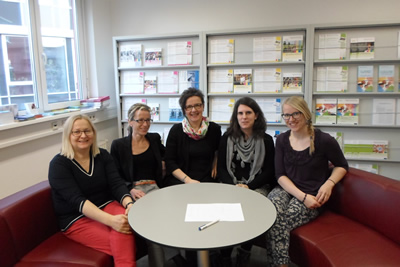
Expert meeting in Graz 25-26 November 2014

We closed the year 2014 with a team meeting in the end of November. We were
lucky to have our associate partner, Prof. Patricia Lamarre with us. Her kind
and specialist contribution especially on our glossary and many English
language related issues was very significant. We were happy to meet also our
consultant, ECML’s Programme Consultant and Special Adviser Frank
Heyworth who gave us valuable feedback. Warm thanks to both of you, Patricia
and Frank!
Again, this has been a hard-working year and, like probably all the project
workers in all kinds of projects, we have struggled to keep our balance within
different more or less official duties. The network meeting in January was
very helpful for re-defining the focus of our materials. Our fellow Auli
Kotimäki worked three months with us and created the visual design for our
forthcoming publication. The visual template for webpages turned out to be
extremely helpful also content-wise. We found it much easier to develop
contents and activities as we could righ-a-way upload them on the website and
see them in their real context.
Our meeting in November was literally a workshop as we commented, revised and
developed our materials mainly in pairs. We aim to get all the English texts
into proof-reading by the end of the year. Both the English and the German
version of the online publication will be finalized by the end of March 2015.
Also our last team meeting, connected to a regional in-service teacher
education seminar arranged by Dagmar Gilly, will take place in March. In
all, our last project year 2015 will be devoted to dissemination of the
results of the project. The publication will be translated to French and
Finnish in order to better cater for the practical and regional needs of pre-
and in-service teacher education.
Network meeting in Graz 30-31 January 2014
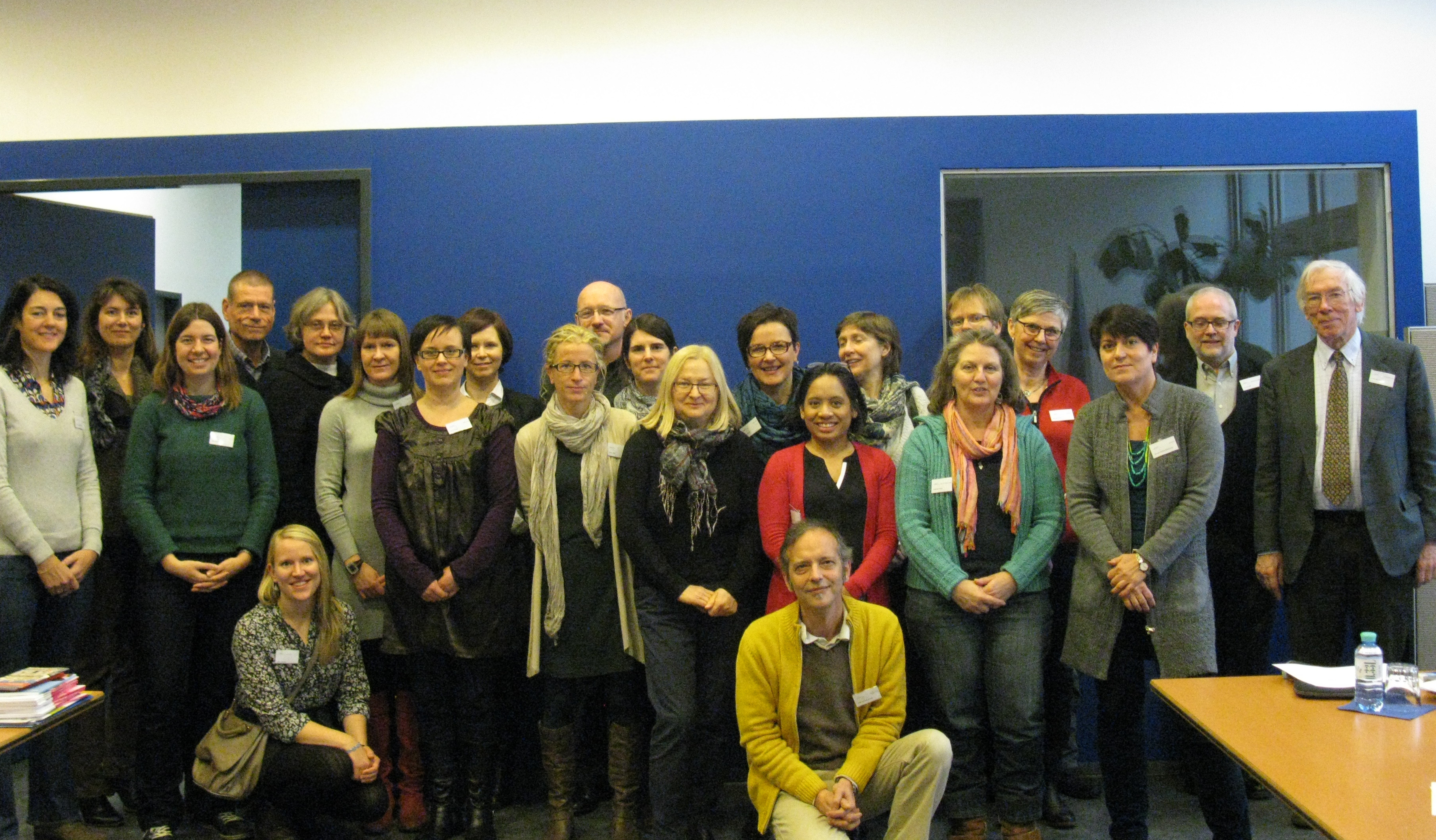
In this network meeting we were altogether 23 people working with the
materials that had been uploaded to the project website before the meeting.
There were 14 participants from 12 countries – we would like to thank
all of you for coming, for sharing your expertise, and for helping us to
further develop the materials! In addition to these expert participants, we
were very lucky to have with us our associate partners: Prof. Patricia Lamarre
from the University of Montreal, teacher trainer Sofie Jonkcheere from the
Regional Integration Center Foyer Brussels , and the Lacs project
representative Prof. Terry Lamb from the University of Sheffield. The Canadian
attendance was increased by PhD Candidate Gail Prasad from the University of
Toronto, who has been working with the learner profiles that are at the core
of the study materials. Especially we would like to thank ECML’s
Programme Consultant and Special Adviser Frank Heyworth for his participation
and important feedback. The Maledive team also got a new member, as Auli
Kotimäki started her three-month Fellowship in the project.
During these two days participants were invited to engage with the already
existing materials, to critically discuss them, and to propose further
development. As there were three study modules, the participants formed three
working groups based on their interest, and worked with the same materials
during two days. The feedback given was very beneficial for the team, and a
great bit of it was concerned with the structure and organization of the study
modules and the final publication, the website. Defining the relations between
each part and determining the key concepts and principles helps us to
reorganise the activities and to sharpen their focus.
Friday morning we had a great opportunity to attend presentations given by
Patricia Lamarre and Gail Prasad. Lamarre’s presentation was an overview
of linguistic and cultural diversity in Canadian schools, and the research and
policies related to it. It also gave us some more insights into responding to
immigrant students in the context of majority language schooling. Prasad
presented a study conducted as a part of her PhD. The study dealt with
creating plurilingual “identity texts” in the mainstream classroom
in Toronto’s English and French schools, and it was very inspiring to
hear about. Both presentations can be found
here.
We concluded the meeting with a session on future collaboration, cooperation
and dissemination. We are very thankful for everyone for sharing their ideas,
materials and expertise. As in the previous workshop, again we realised that
our focus needs to be more precise, both with addressing the target group (ML
teacher training) and with the activities we offer. We can also benefit from
some activities and approaches developed in prior ECML projects and other
projects. During this spring our fellow will be developing the website, and we
will be working with the materials in order to create a coherent publication.
Expert meeting, 19-20 September 2013
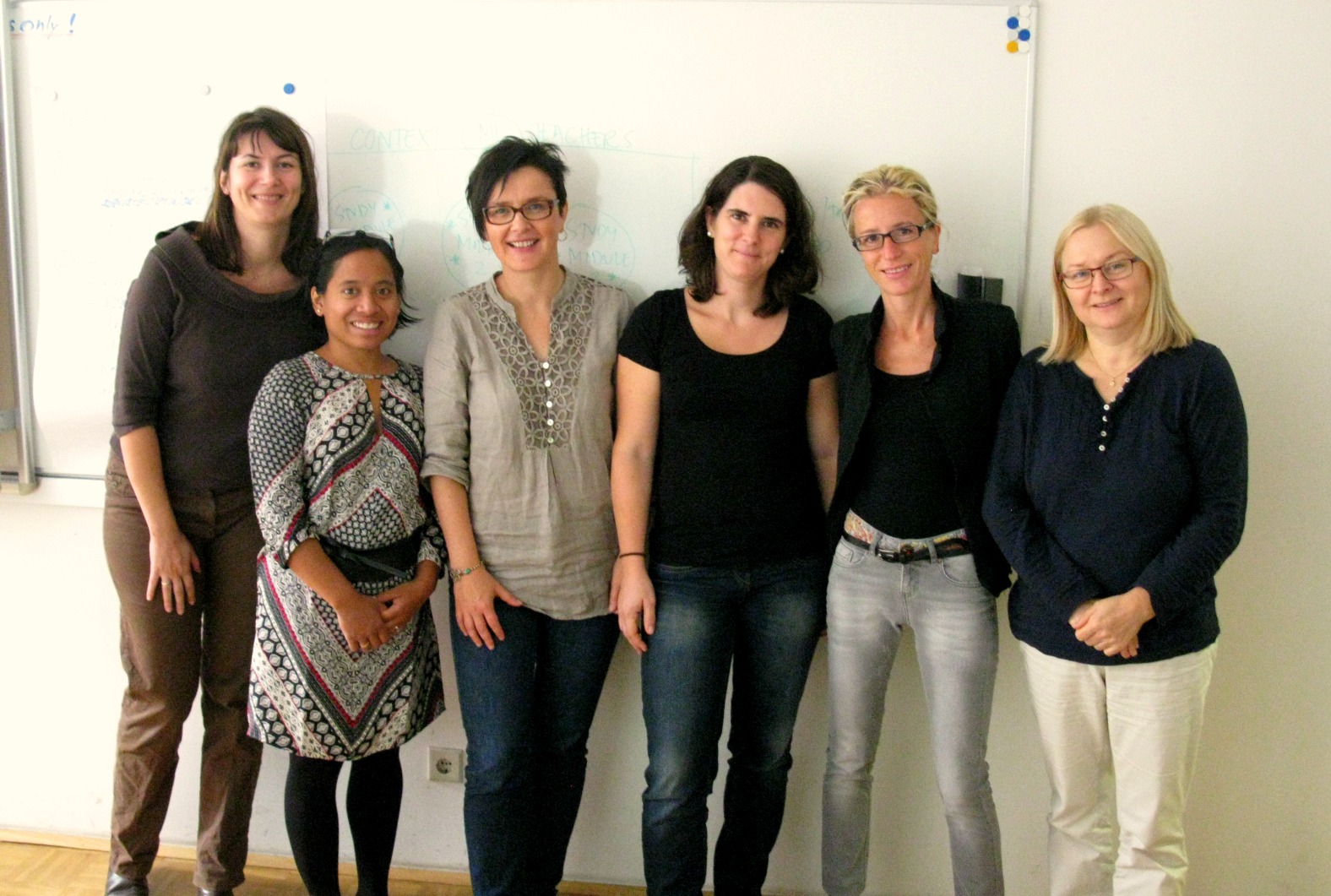
The Maledive team got together for the third expert meeting. This time we had
two visitors: PhD student Gail Prasad from the University of Toronto attended
the second day of the meeting and our associate partner Prof. Patricia Lamarre
from the University of Montreal met us via Skype. We are happy for our
Canadian expert partners in cooperation.
We continued to work on the study modules and materials for teacher education.
We had good discussions concerning pedagogical approach adopted in our
materials and ended up preferring inductive approach from practice to theory
rather than theory-led approach. Two drafts of materials have already
been uploaded on our website under heading Teacher development and there is
more to come in the near future. Have a look and if possible, try them out and
send your comments to us via our new email address: maledive.ecml (at)
gmail.com.
We are looking forward to the Network meeting in January, 30-31, 2014. An
effective group of experts will assemble for discussing plurilingualism in
majority language teaching and teacher education and for developing materials.
Many of the participants from our February 2013 workshop have shown interest
in attending, and we have invited also other experts from our networks. In the
beginning of next year we shall have a fellow working with us for three
months. The selection process of the fellow is currently underway. A good
fellow is a valuable support for the project work.
Presentation of MALEDIVE, Paris, France
Promoting plurilingualism in majority language teacher education
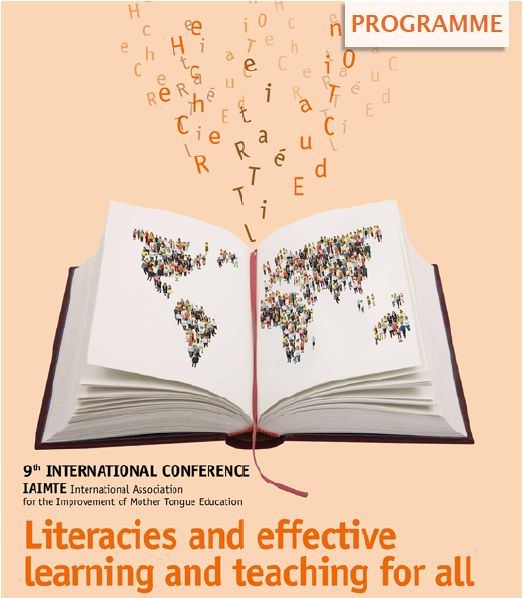
9th IAIMTE International Conference: "Literacies and effective learning
and teaching for all"
IAIMTE = International Association for the
Improvement of Mother
Tongue Education (//145.18.11.72/projecten/gert/iaimte/default.asp)
IAIMTE is an international association of mother tongue (read: majority
language) educators, so the audience of the conference was crucially important
to us. Our aim was to inform majority language experts on our project and more
generally on ECML and welcome them to our networks. It seemed to us that
within majority language teaching/research plurilingual approaches still seem
to be few and far between. They are not considered as meaningful or part of
the core areas of majority language teaching. Participants in the paper
session called Literacy and multilingual situations very much agreed on the
problematic, isolated role of majority language in relation to other languages
(L1s and foreign languages) in school and saw a need for change.
>The work of the ECML raised a lot of interest among listeners in our paper
session. All in all, the conference very much met the expectations we had set
to it. In addition to contacts made and interesting presentations heard,
preparing and giving a presentation and relating the project to wider research
and developmental approaches is always useful and helps in advancing the
project and better meet the needs and interests of people in the field.
Regional Maledive workshop in Montpellier, France, 4-5 April 2013
The workshop in Montpellier, which was organized by Nathalie Auger in
cooperation with the "ADEB" (Association pour l´ enseignement
bilingue en France), was a great success. There were about 20 participants
coming from different schools or universities in the South of France, among
them as “special guests” Daniel Coste and Martine Kervran.
Although most of the participants had a foreign language or French as a second
language and not a majority language background, we had a lot of very
interesting discussions. This was not only due to the expertise of our
“special guests”; most of the participants seemed to be very
familiar within the thematic areas “plurilingualism”,
“language awareness” etc., too. Apart from Nathalie Auger the
MALEDIVE team was represented by Katja Schnitzer.
At the first day we discussed issues linked with the French situation.
Nevertheless there could be identified various links to the situation f.i. in
Germany and Switzerland (and supposably as well in other countries as Austria,
Italy, Finland, etc.). This underlines the need of European initiatives, such
as our project MALEDIVE offers. At the second day we had the chance to present
the MALEDIVE project and the idea about developing study modules for teacher
education / teacher in service training by introducing the draft version of
the first module. First of all, we had a very positive feedback from the
participants concerning the project and got some real good comments for
the further development of the modules. This was encouraging because it shows
that our modules cannot only reach majority language, but also teachers with a
second or foreign language background. Furthermore, we were really happy that
some of the colleagues are interested in piloting one of our modules. The
workshop atmosphere was very positive; in the end everybody had the wish to
repeat it every maybe 2 years (this is due to Nathalie, who did a real good
job, thanks again for everything!). This could be a very good possibility to
disseminate the final results of our MALEDIVE project.
Workshop in Graz, 14-15 February 2013
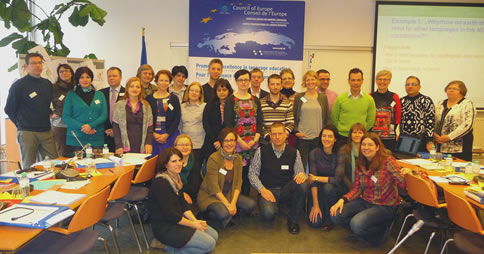
We were altogether 32 participants from 21 countries in the workshop. Thank
you for each and everyone for coming!
During the two days participants were first invited to share and compare
objectives of their home region’s curricula and to discuss elements
promoting plurilingualism. The current state of development in the Maledive
project was discussed more in detail after the draft list of study modules was
introduced and the first module on managing diversity in the majority language
(ML) classroom presented. The participants were invited to comment on and
develop further the work done by the team. We had good discussion on the key
challenges in promoting plurilingualism in the majority language teaching: how
to really make the change in the mindset from monolingual to plurilingual? And
even before that, how to convince teachers of the need for the change?
The new content website was launched in the end of the first day. The work of
progress will be published there and we wish our networks welcome to
contribute to our work by sharing their experiences and materials and
commenting and trying out the materials developed by the team. Some time was
spent also to other related ECML projects, as the representatives of PlurCur,
Carap/Frepa and Clil were asked to give short presentations on their projects
and link them to the Maledive. Finally, a session on future collaboration and
network opportunities completed the two‐day workshop.
The whole process of planning and carrying out the workshop was extremely
useful and helped us in further structuring of the project. We came up with
new ideas and working methods, and we learnt that our focus in material making
has probably been somewhat too general. In the future we try to get more
directly to the core of ML teaching and the needs of teachers. This will be
done by increasing the number of local activities, setting up research
projects and using the website in a more target-oriented way in teacher
education.
Project developments in 2012
During the first year of the project we had two Expert meetings (in March and
August) and a lot of meetings via Skype. We have to admit that it has been
challenging to match the timetables and keep the deadlines as we are all
involved in various projects and tasks. Therefore, regular collaboration via
Skype meetings has proven more difficult than we expected. However, we managed
to set the project in context in terms of other ECML projects and team
members' other projects and activities. We also started our concrete work
with the study modules for pre- and in-service teacher education. A
tentative list of topics for our study modules looks like that:
- Managing language diversity in the classroom
- Building on learners’ linguistic experience and skills
- Reflecting and adapting one’s teaching methods
- Promoting autonomous learning and supporting students’ agency
-
Collaboration with other teachers (language teachers + teachers of other
subjects)
We don't want to hide our work but instead, we are planning to publish
even draft versions of the study modules for teacher education. You will soon
find them on this website and we kindly ask you to contribute to our work by
sharing your experiences, ideas and possibly materials. And we warmly welcome
your comments - even and especially the critical ones!
Now we are looking forward to our workshop in February. About 30 participants
from almost 20 countries! We have hight expectations on what the WS brings
along.
Expert meeting, 27-28 August 2012
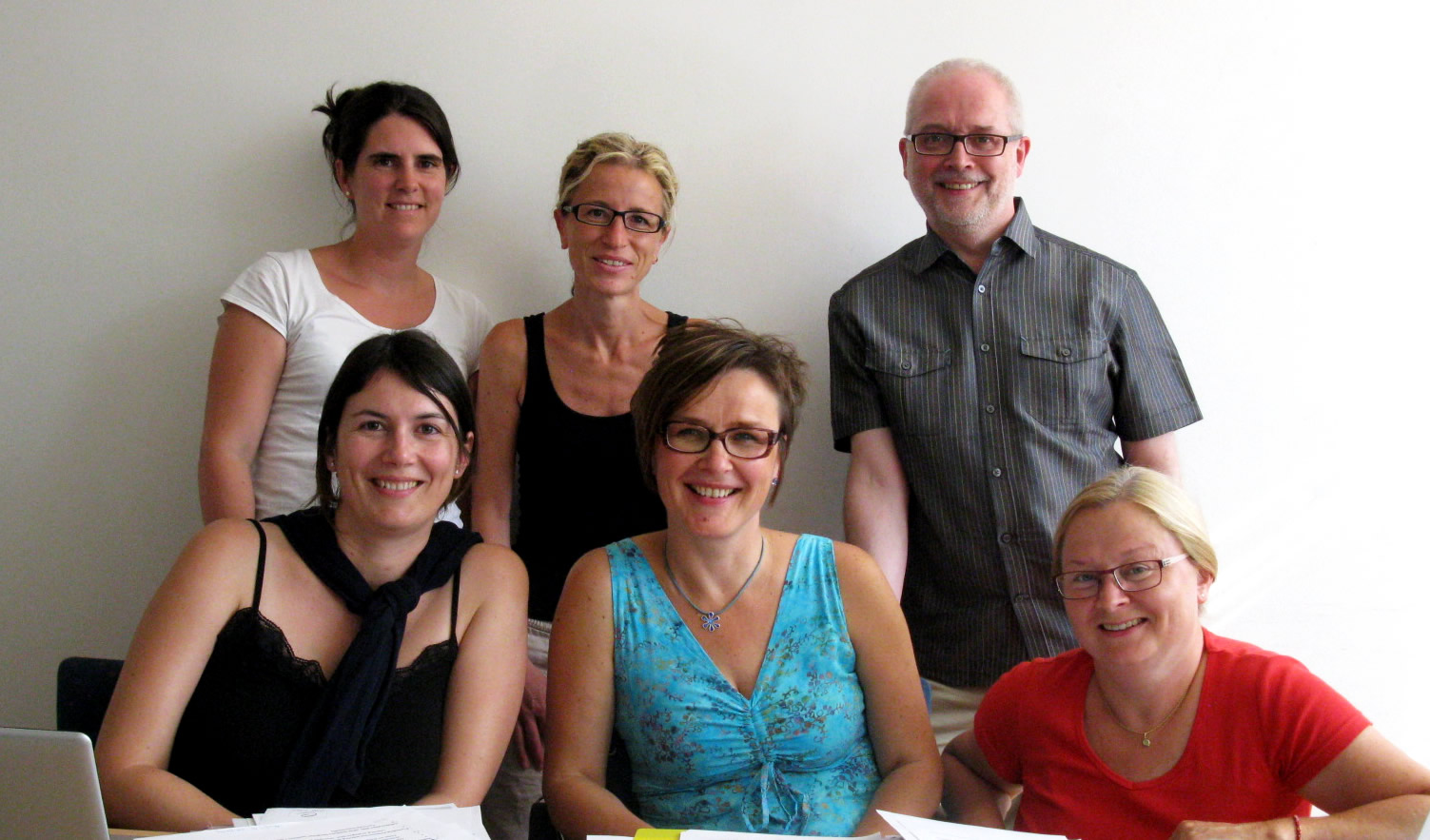
The key words describing our Expert meeting in Graz are scenario and
interaction. Why them? First of all, we continued working on and concretizing
our scenario for majority language teaching and the structure and outline of
our future website. In our material work for teacher education we intend to be
practice-driven (from practice to theory rather than vice versa) and build on
the work done in the former Marille project, especially the teacher’s
knowledge and skills described in the publication of Marille (see
//marille.ecml.at/).
The key question in developing the scenario and modules for teacher education
is, how majority language curriculum could be enriched through plurilingual
approach and how to make a change first in teachers’ beliefs and
thereafter in their practices. In this work we have very much benefited of the
work done by Beacco, Byram, Cavalli, Coste, Cuenat, Goullier and Panthier in
their
Guide for the development and implementation of curricula for
plurilingual and intercultural education
(Language Policy Division, CoE 2010).
Interaction describes our meeting for two reasons: Firstly, our interaction
within the team was very intensive and productive. But that certainly is not
enough for a target-oriented project, and therefore we strive for keen
interaction with our networks and teacher educators working with these issues
in their own countries. We try to make our website interactive and invite
colleagues in various countries to come and comment on our work in progress
and share their ideas and practices with us and the Maledive network.
So, do keep in touch and we hope that, as soon as our new website will be
published, you will find it interesting and useful and keep visiting it and
contributing in developing the materials.
Regional workshop in Helsinki, 8 June 2012
Language teachers promoting a common cause: working on a shared vision for
language subjects in school
Teachers of foreign languages (FL), majority language (ML) and Finnish as a
second language (SL) were invited to a workshop arranged by Terry Lamb and
Eija Aalto in Helsinki. They were invited to assemble and work on the issues
that all language subjects have in common in school and how to promote
cooperation across language subjects and enhance learners’ individual
and multilayered language repertoires and support the development of a
holistic linguistic identity.School teachers' summer holiday had just
begun but we were happy and lucky to get 35 enthusiastic language teachers
from different parts of Finland to participate. They worked mainly in mixed
groups with various activities, in which they considered the benefits of
collaboration between language subjects, compared the aims and objectives of
ML, SL and FL curricula and developed concrete materials and classroom
activities to support and enhance plurilingualism. The workshop was
intensive and fun. Nice atmosphere and rewarding discussions convinced us of
the usefulness of regional activities. We will certainly arrange more of them
in various countries. Looking forward to the future workshops - stay online :)
First expert meeting, 5-7 March 2012
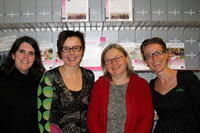 We would like to proudly announce that the acronym of our new project is
MALEDIVE, which refers to the DIVErsity in MAjority Language Education and
aims to encourage everyone to DIVE into languages, might it be majority,
second or foreign language. We definitely hope that the connotation attached
to the name and having to do with sunny islands adds to the positive image of
the project :)
We would like to proudly announce that the acronym of our new project is
MALEDIVE, which refers to the DIVErsity in MAjority Language Education and
aims to encourage everyone to DIVE into languages, might it be majority,
second or foreign language. We definitely hope that the connotation attached
to the name and having to do with sunny islands adds to the positive image of
the project :)
We are a team of female power: Andrea Abel from Italy, Dagmar Gilly from
Austria, Katja Schnitzer from Switzerland/Germany, Nathalie Auger from France
and Eija Aalto from Finland. We met f2f for the first time in the beginning of
March, 2012 (unfortunately, Nathalie could join us only via Skype and she is
therefore not present in our joint picture above). We got off to a good start
and developed right away an enthusiastic and cooperative atmosphere and had
really hard-working three days in Graz.
During our meeting we agreed on the timeline and the focuses of the full
project and details of the annual plan. We are in the very beginning of the
project and therefore many ideas are only gradually taking their shape. We
hope to bring majority, foreign and second language teachers together and
develop a scenario from teacher education to implementing in the classroom.
In our meeting we also worked on the project website and planned the structure
of it. We are currently pooling the existing materials and resources we can
build on and collecting our networks. As soon as possible we will invite our
contacts from various countries to come and contribute to our website:
commenting our plans and work in progress, discussing issues in the wind... We
are planning to arrange many regional activities, and the first workshops for
majority language (ML), foreign language (FL) and second language (SL)
teachers will be arranged in Finland and Switzerland by the end of the summer,
2012. Keep coming to our website to learn more of our plans!